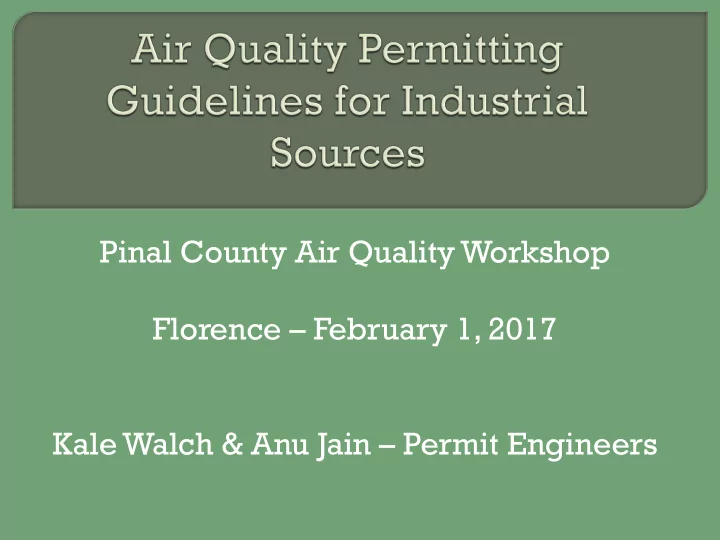

Pinal County Air Quality Workshop Florence – February 1, 2017 Kale Walch & Anu Jain – Permit Engineers
Facilities that have a potential to emit 5.5 pounds per day or 1 ton per year of any regulated pollutant.
Nitrogen Oxides (NOx) Carbon Monoxide (CO) Sulfur Dioxide (SO 2 ): Volatile Organic Compounds (VOCs) Hazardous Air Pollutants (HAPs) Particulate Matter (PM10/PM2.5)
-Identifies air quality rules that a source is subject to: Local (PCAQCD), State (Statutes) or Federal (EPA). -Contains emission limits for each significant emission unit. -Defines allowable hourly, monthly or annual throughputs. -Monitoring, recordkeeping, and reporting requirements. -May contain limitations to avoid stringent air quality requirements or higher fees.
Class I -New Source Review sources (PSD or NNSR) - Title V sources (above “major source” thresholds) Class II -Synthetic minor sources -Medium & small spray paint operations, feed mills, metal fabrication crushing/screening, cotton gins, crematories etc. Class III Small gas stations, auto body shops, dry cleaners…
Small sources Area source rules may be incorporated into permits • Medium sources Area source rules may be incorporated into permits • Source might have to take Federally Enforceable limits to stay under 100 tons per • year (tpy) May have to implement Reasonably Available Control Technology (RACT) level • controls Large sources • Nonattainment New Source Review (NNSR) for sources with a PM10 potential to emit (PTE) over 100 tpy New sources must install Lowest Achievable Emission Rate Technology (LAER) which • does not consider economic impacts Existing sources must implement Reasonably Available Control Technology (RACT) • level controls Offsets at a ratio of at least 1:1 will be required • Area source rules may be incorporated into permits •
-Permit Application 1) -Additional Forms (if applicable) for Fuel Burning 2) equipment, Storage Tanks, Crushing and Screening equipment, Cotton Gins, Generators, Soil Vapor Extraction Units, Spray Paint Booths and Wastewater Treatment Plants. - Generic Outline or Air Quality Permit Filing 3) Instructions (process description, site plan, flow diagram, plant and equipment capacities, MSDS sheets etc.) -Application fee 4) Forms available at 5) http://www.pinalcountyaz.gov/Departments/AirQ uality/Pages/IndustrialPermits.aspx
Db – Industrial-Commercial-Institutional Steam Generating Units GG – Stationary Gas turbines LL – Metallic Mineral Processing Plants OOO – Nonmetallic Mineral Processing Plants UUU – Calciners and Dryers in Mineral Industries IIII – Compression Ignition Internal Combustion Engines JJJJ – Spark Ignition Internal Combustion Engines KKKK – Stationary Combustion Turbines
6H’s – Paint Stripping and Miscellaneous Surface 6H’s – Paint Stripping and Miscellaneous Surface Coating ( includes Autobody shops) Coating ( includes Autobody shops) 6W’s – Plating/Polishing 6W’s – Plating/Polishing 6X’s – Metal Fabrication/Finishing 6X’s – Metal Fabrication/Finishing 6Z’s – Aluminum, Copper and other non-ferrous 6Z’s – Aluminum, Copper and other non-ferrous Foundries Foundries 7C’s – Paint Manufacturers 7C’s – Paint Manufacturers 7D’s – Prepared Feed Manufacturers. 7D’s – Prepared Feed Manufacturers. 4Z’s (RICE) – Diesel and Natural Gas Engines. 4Z’s (RICE) – Diesel and Natural Gas Engines. -Each one contains a specific Compliance Date. -Must submit INITIAL NOTIFICATION. -Brochures available at www.epa.gov/ttn/atw/area/arearules.html
-Application Fee (Non-refundable) -Permit Processing Fee (not applicable to Class III sources or transfers) -Annual Fee -Emissions Fee (only for Class I sources) *Fees for 2017 are posted on our website. *Fees are adjusted annually by the Consumer Price Index (CPI).
Permits valid for 5 years. Letters to renew permits are mailed at least couple of months before the permit expiration date. Revisions/Transfers do not start the clock.
TYPES: -Permit Revision: Changes in equipment, process, and or products. -Permit Transfer: Ownership or facility name change
- Same application form as for “New” permits, but check “Revision” box. - Same information needed as for “New” permits, but only in relation to changes and or modifications. -Revision application fee applicable to Class I permits only.
-Same Application form but check “Transfer” box. -Apply before the transfer occurs. -No processing fee associated with transfers. -Transfers cannot be used for location changes, a new permit must be issued.
-Mandatory Public Notice period of 30 days for new permits, significant revisions, and renewals. -Class I permits have an additional mandatory EPA review period of 45 days. -Permit processing time depends on the complexity, and the completeness of the application.
Some of the issues related to permitting: -Operating without a permit. -Adding an emission unit without revising the permit. -Process or equipment list not getting updated during renewal. -Permit transfer. -Not reading the permit. -Not asking questions.
Kale Walch, Air Quality Manager (520) 866-6860 kale.walch@pinalcountyaz.gov Anu Jain, Air Quality Engineer (520) 866-6931 anu.jain@pinalcountyaz.gov
Recommend
More recommend